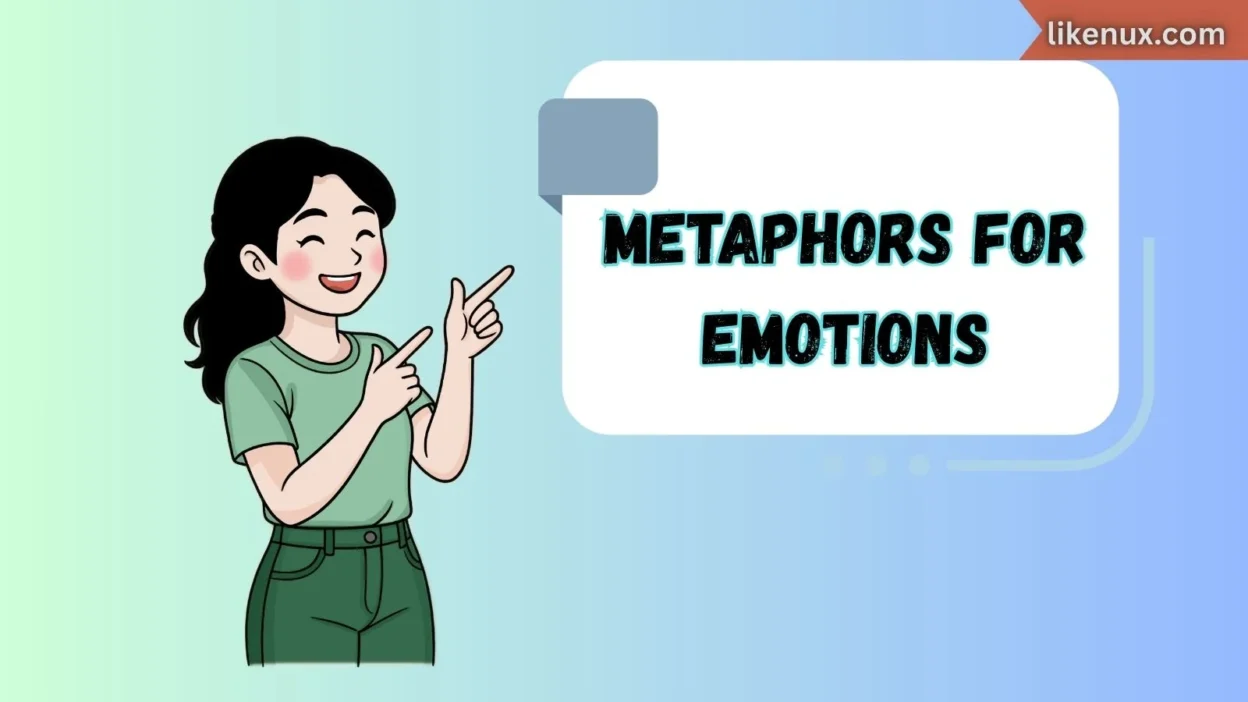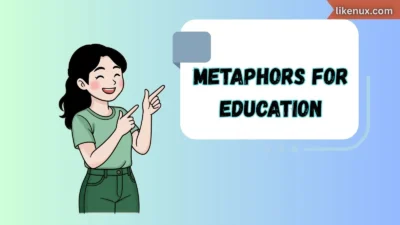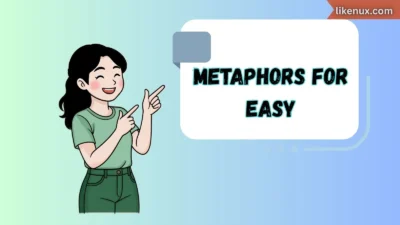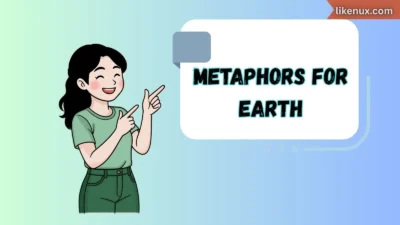Emotions are the language of the soul, shaping how we think, act, and connect with others. Sometimes, words fall short when we try to express what our hearts truly feel — and that’s where Metaphors for Emotions come alive. They help us describe joy, sadness, anger, fear, and love in a way that’s both vivid and relatable.
In my years of writing and teaching emotional expression, I’ve found that metaphors give our feelings depth — turning plain sentences into something that truly resonates. Whether you’re crafting a heartfelt message, journaling your thoughts, or trying to communicate your emotions more clearly, these metaphors will help you express what’s inside with authenticity and warmth.
Let’s explore 25 beautiful metaphors for emotions — designed to help you connect more deeply with yourself and others.
1. Emotions are a storm inside the heart
Meaning: Feelings can be wild, unpredictable, and powerful.
In a sentence: When I lost my best friend, my heart felt like a storm with no calm in sight.
Best use: Describing deep sadness, anger, or internal chaos.
Other ways to say: Emotional whirlwind, inner turmoil, tempest of feelings.
2. Joy is sunshine breaking through the clouds
Meaning: Happiness feels like light after darkness.
In a sentence: Her smile was sunshine breaking through the clouds of my bad day.
Best use: Expressing moments of relief or hope.
Other ways to say: Burst of light, ray of happiness, glimmer of hope.
3. Sadness is a heavy blanket
Meaning: It covers everything, making it hard to move or feel free.
In a sentence: After the breakup, sadness wrapped around me like a heavy blanket.
Best use: When describing emotional weight or sorrow.
Other ways to say: Cloud of grief, emotional burden, weight of sorrow.
4. Anger is a burning fire
Meaning: It consumes everything in its path.
In a sentence: His anger burned like fire, leaving nothing but ashes of regret.
Best use: Expressing rage or intense frustration.
Other ways to say: Fury blazing, inner flame, seething heat.
5. Love is an ocean
Meaning: Deep, vast, and sometimes unpredictable.
In a sentence: Our love was an ocean—endless, mysterious, and sometimes stormy.
Best use: Romantic or poetic expression.
Other ways to say: Sea of affection, emotional depth, boundless feeling.
6. Fear is a shadow
Meaning: It follows you, even when you try to ignore it.
In a sentence: Fear lingered like a shadow, always just behind me.
Best use: Expressing anxiety or worry.
Other ways to say: Haunting presence, dark thought, quiet dread.
7. Hope is a flickering candle
Meaning: Fragile but persistent, even in the darkest times.
In a sentence: Even in despair, a small candle of hope kept burning inside me.
Best use: Inspirational or motivational writing.
Other ways to say: Glimmer of faith, spark of belief, light within.
8. Happiness is a warm breeze
Meaning: Gentle and comforting, filling you with peace.
In a sentence: Happiness brushed past me like a warm summer breeze.
Best use: Reflecting contentment or inner peace.
Other ways to say: Feeling of calm, breath of joy, wave of comfort.
9. Guilt is a chain around the heart
Meaning: It restricts and burdens you emotionally.
In a sentence: He carried guilt like a chain that wouldn’t break.
Best use: Reflective or confessional tone.
Other ways to say: Shackles of regret, emotional weight, inner restraint.
10. Anxiety is a buzzing bee
Meaning: Constant and restless, hard to ignore.
In a sentence: Anxiety buzzed in my chest like an angry bee.
Best use: Describing stress or unease.
Other ways to say: Nervous hum, restless feeling, jittery pulse.
11. Grief is an ocean wave
Meaning: It comes and goes in powerful surges.
In a sentence: Some days grief hits me like an unexpected wave.
Best use: Describing mourning or deep sadness.
Other ways to say: Tide of sorrow, flood of emotion, wave of loss.
12. Excitement is electricity in the air
Meaning: A charged feeling that makes everything vibrant.
In a sentence: The excitement before graduation felt like electricity in the air.
Best use: Energetic or celebratory moments.
Other ways to say: Buzz of energy, thrill, spark of anticipation.
13. Shame is a shrinking shadow
Meaning: It makes you want to disappear.
In a sentence: Shame crept over me like a shrinking shadow.
Best use: Writing about embarrassment or regret.
Other ways to say: Feeling of smallness, inner guilt, emotional retreat.
14. Trust is a fragile glass
Meaning: Once broken, it’s hard to repair.
In a sentence: Trust shattered between us like glass hitting the floor.
Best use: Relationships, betrayal, or honesty themes.
Other ways to say: Delicate bond, fragile belief, emotional glass.
15. Confidence is a mountain
Meaning: Strong, steady, and grounded.
In a sentence: Her confidence stood tall like a mountain against doubt.
Best use: Empowering, motivational tone.
Other ways to say: Pillar of strength, rock-solid faith, grounded belief.
16. Compassion is a gentle hand
Meaning: Soft, supportive, and healing.
In a sentence: Her compassion was a gentle hand guiding me through pain.
Best use: Describing care and kindness.
Other ways to say: Touch of empathy, heart of kindness, soft understanding.
17. Regret is a ghost
Meaning: It haunts you long after the moment has passed.
In a sentence: Regret followed him like a ghost whispering what-ifs.
Best use: Reflective or poetic writing.
Other ways to say: Echo of past, haunting memory, lingering sorrow.
18. Pride is a crown
Meaning: A symbol of self-worth and achievement.
In a sentence: She wore her pride like a crown after overcoming her fears.
Best use: Positive self-expression.
Other ways to say: Badge of honor, sense of accomplishment, self-respect.
19. Envy is a green flame
Meaning: Consuming yet hidden beneath the surface.
In a sentence: Envy burned quietly, a green flame in his chest.
Best use: Writing about jealousy or rivalry.
Other ways to say: Green-eyed feeling, quiet resentment, subtle longing.
20. Peace is still water
Meaning: Calm, deep, and undisturbed.
In a sentence: After years of chaos, peace felt like still water at dawn.
Best use: Reflecting serenity or mindfulness.
Other ways to say: Calm lake, emotional balance, quiet soul.
21. Courage is a roaring lion
Meaning: Bold, brave, and unyielding.
In a sentence: She faced her fears like a roaring lion.
Best use: Motivational or inspirational tone.
Other ways to say: Brave heart, fearless spirit, inner warrior.
22. Loneliness is an empty room
Meaning: Quiet and echoing with absence.
In a sentence: Loneliness sat beside me in the empty room of my heart.
Best use: Emotional or introspective writing.
Other ways to say: Silent space, hollow heart, solitude.
23. Anguish is a cracking mirror
Meaning: Reflects a distorted, painful version of yourself.
In a sentence: Anguish shattered my reflection like a cracking mirror.
Best use: Expressing emotional pain or identity crisis.
Other ways to say: Broken image, distorted soul, fractured self.
24. Gratitude is a blooming flower
Meaning: It grows when nurtured with kindness.
In a sentence: Gratitude bloomed in my heart like a spring flower.
Best use: Thankfulness, mindfulness, or appreciation.
Other ways to say: Heartfelt thanks, sense of appreciation, joy of giving.
25. Hope is a rising dawn
Meaning: A fresh start that brings light after darkness.
In a sentence: After every hard night, hope rises like dawn on the horizon.
Best use: Uplifting, spiritual, or motivational writing.
Other ways to say: New beginning, light of tomorrow, promise of renewal.
FAQs about Metaphors for Emotions
1. Why are metaphors important in expressing emotions?
Metaphors help translate complex emotions into vivid imagery, making your expression more relatable and powerful.
2. How can I use these metaphors in writing?
Use them in journals, poetry, speeches, essays, or heartfelt messages to add depth and emotional resonance.
3. Can metaphors help with emotional healing?
Yes — writing or speaking through metaphors often helps you process emotions more gently and with greater self-understanding.
4. Are these metaphors universal?
Most are — because emotions like love, fear, and hope are shared human experiences, though interpretations may differ by culture.
5. What’s the best way to create my own metaphor for emotions?
Start by comparing your feeling to something tangible — nature, objects, or experiences — and trust your emotional intuition.
Conclusion
Emotions are the threads that weave our human experience together. When we describe them through metaphors, we give them color, movement, and life. Whether you’re a student, writer, or someone just trying to communicate more meaningfully, these 25 metaphors for emotions can help you open your heart and express yourself with authenticity.
Remember — your feelings are valid, and language is your bridge to understanding them. Keep speaking from the heart, and you’ll find that the right words will always find you.

Daniel Matthew is a passionate visionary who believes in creativity, purpose, and innovation. With a focus on growth and authenticity, he turns every idea into meaningful impact.



